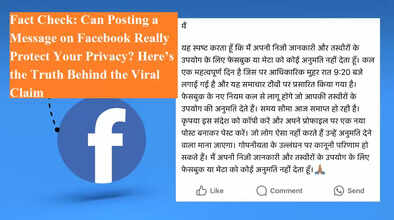Fact Check: Can Posting a Message on Facebook Really Protect Your Privacy? Here’s the Truth Behind the Viral Claim

A viral message is making the rounds on Facebook, claiming that copying and pasting a specific text on your timeline can stop the platform from using your private photos and data. The post warns that failing to do so gives Facebook legal rights to access and use your personal information. Many users have rushed to share it out of concern—but does it actually work? Let’s break down the facts.
The Viral Privacy Post and Its Claims
The circulating message urges Facebook users to copy-paste a particular statement on their profile, supposedly preventing the platform from using their data. It suggests that without this “declaration,” Facebook gains full legal authority over photos, videos, and personal details.
While the wording sounds urgent and official, the reality is very different. This is not the first time such messages have gone viral. Similar posts have appeared in the past—this time, the difference is that it’s spreading in Hindi among Indian users, while earlier versions circulated in English globally.
Why This Post Won’t Protect Your Privacy
When you sign up for a Facebook account, you agree to its Terms & Conditions. These legal terms clearly state what data Facebook collects and how it is used. Copying and pasting any message on your wall does not override these terms or change the platform’s policies.
If you truly want to limit what Facebook can access or share, the only effective way is to adjust your privacy settings in the app or website. Viral posts have no legal effect and will not protect your information.
What Data Does Facebook Actually Collect?
Facebook gathers a wide range of user information, including:
-
Personal details: Name, birthday, contact list, and group memberships.
-
Activity data: Interests, browsing habits, and how you use features.
-
Device information: Operating system, battery level, network details, browser type, and location.
You can limit some of this data collection by managing your account settings. For example, turning off certain features or restricting app permissions can reduce the amount of information Facebook stores about you.
Why You Should Be Careful with Viral Posts
Messages like these can be more than just misinformation—they can be a tool for scammers. Cybercriminals sometimes monitor such viral trends to identify users who share unverified content without checking its authenticity. This behavior can make you more vulnerable to phishing attacks, online fraud, and other security risks.
Proven Ways to Protect Your Facebook Privacy
Instead of relying on copy-paste “legal notices,” follow these steps to improve your security and privacy:
-
Update privacy settings: Control who can view your posts, photos, and profile details.
-
Turn off Off-Facebook Activity: Reduce the amount of data collected from other websites.
-
Remove suspicious third-party apps: Revoke access for apps you no longer trust or use.
-
Manage ad preferences: Decide what kind of targeted ads you want to see.
-
Be cautious with personal details: Avoid publicly posting sensitive information or live locations.
The Bottom Line
No matter how official a viral Facebook post may look, simply copying and pasting it on your wall will not change the platform’s legal rights over your data. The only effective way to safeguard your privacy is through your account’s official settings—and by staying alert against misleading claims that could put both your privacy and online security at risk.

